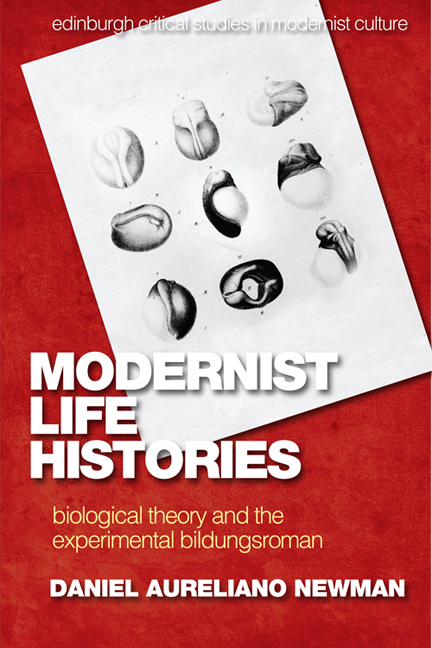Book contents
- Frontmatter
- Contents
- List of Figures
- Preface
- Acknowledgements
- Series Editors’ Preface
- List of Abbreviations
- Introduction
- 1 Bildung, Biology and the Narrative Structure of Development
- 2 A Portrait of the Artist as a ‘Biologist in Words’: Language, Epiphany and Atavistic Bildung
- 3 Mendelian Inheritance, ‘Eternal Differences’ and Entropy in Howards End
- 4 ‘Tampering with the Expected Sequence’: Heterochrony and Sex Change in Orlando
- 5 Anachrony, Neoteny and the ‘Education of an Amphibian’ in Eyeless in Gaza
- 6 Beginning Again: Darwin’s Caterpillar from George Eliot to Beckett
- Conclusion
- Bibliography
- Index
Conclusion
Published online by Cambridge University Press: 23 April 2021
- Frontmatter
- Contents
- List of Figures
- Preface
- Acknowledgements
- Series Editors’ Preface
- List of Abbreviations
- Introduction
- 1 Bildung, Biology and the Narrative Structure of Development
- 2 A Portrait of the Artist as a ‘Biologist in Words’: Language, Epiphany and Atavistic Bildung
- 3 Mendelian Inheritance, ‘Eternal Differences’ and Entropy in Howards End
- 4 ‘Tampering with the Expected Sequence’: Heterochrony and Sex Change in Orlando
- 5 Anachrony, Neoteny and the ‘Education of an Amphibian’ in Eyeless in Gaza
- 6 Beginning Again: Darwin’s Caterpillar from George Eliot to Beckett
- Conclusion
- Bibliography
- Index
Summary
The foregoing chapters add to the already substantial refutation of C. P. Snow's comment on ‘how very little of twentieth-century science has been assimilated into twentieth-century art’ (1998: 16). More specifically, they redress the relative lack of attention paid to biology in studies of literature and science in the early twentieth century. By highlighting ways in which biology helped quicken the modernist imagination, the preceding chapters also counter the tendency among literary critics to focus on biology's negative aspects and applications, especially genetic determinism and biopolitical control over human bodies. The go-to modernist text in this context is of course Brave New World. Important as they are, these perspectives can overshadow other manifestations of biological theory in modernism. Often overlooked are texts which, like Huxley's Eyeless in Gaza and After Many a Summer, subtly work biology into narrative structure and character construction. These incorporations are not incompatible with the more visible, thematic biological engagements that interest most critics; as most of the chapters in this book attest, explicit references often serve to signal and confirm covert formal experiments with biology (thus my biological reading of Eyeless in Gaza's structure was both triggered and endorsed by Huxley's seemingly trivial allusion to axolotl metamorphosis). But structural engagements with biology are liable to be overlooked or overshadowed by more explicit biological content.
Biology's role in life narratives is a significant point of continuity linking the earliest Bildungsromane to those still being published today. It also represents a unique lens into the ways in which the genre has changed over the course of its history. I have already discussed these continuities and differences in the context of Victorian and modernist Bildungsromane. In the remaining pages I briefly survey how paradigm shifts in biology since the 1950s have registered in contemporary novels of formation, differentiating them from their early to mid-century counterparts. A literary history of biology and the contemporary novel would thus have to consider modernist antecedents but also account for ways in which biology has changed in focus and scope since the Second World War.
- Type
- Chapter
- Information
- Modernist Life HistoriesBiological Theory and The Experimental Bildungsroman, pp. 188 - 192Publisher: Edinburgh University PressPrint publication year: 2018



